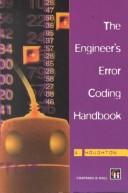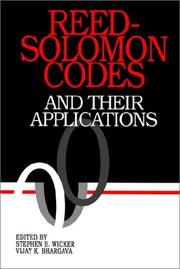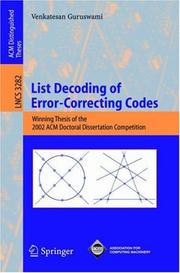| Listing 1 - 4 of 4 |
Sort by
|

ISBN: 041279070X Year: 1997 Publisher: London Chapman and Hall
Abstract | Keywords | Export | Availability | Bookmark
 Loading...
Loading...Choose an application
- Reference Manager
- EndNote
- RefWorks (Direct export to RefWorks)

ISBN: 0780353919 0470546344 078031025X 0470547235 9780470546345 9780780353916 Year: 1994 Publisher: Piscataway (NJ) : New York : IEEE Press ; Institute of Electrical and Electronics Engineers,
Abstract | Keywords | Export | Availability | Bookmark
 Loading...
Loading...Choose an application
- Reference Manager
- EndNote
- RefWorks (Direct export to RefWorks)
Electrical Engineering/Communications/Information Theory "The Berlekamp article alone will make this book worth having." --David Forney, Vice President, Motorola Codex Reed-Solomon Codes and Their Applications Edited by Stephen B. Wicker, Georgia Institute of Technology and Vijay K. Bhargava, University of Victoria On the Voyager spacecraft, they were responsible for sending clear pictures of the planets back to earth. They have also played a key role in the digital audio revolution. They are Reed-Solomon error codes: the extremely powerful codes that provide critical error control for many different types of digital communications systems. This outstanding collection of thirteen original articles written by leading researchers in the field provides a uniquely comprehensive overview of the history and practical applications--some never before published--of these important codes. Key features include: * Thirteen original articles from leading researchers in the field, with a historical overview by Reed and Solomon * An explanation of how Reed-Solomon codes were used in the Voyager spacecraft and how they are currently used in the compact disc player * Specific applications for digital audio, data transfer over mobile radio, satellite communications, spread spectrum systems, and more * New techniques for improving the performance of your own communications systems This book will be of interest to design and research engineers in the telecommunications field, particularly those in the aerospace/satellite and mobile radio industries. It is also well-suited for use as an advanced-level textbook on the subject of error control coding. Books of Related Interest from IEEE Press Clauide Elwood Shannon: Collected Papers Edited by N. J. A. Sloane and A. D. Wyner. AT&T Bell Labs The first published collection of papers by Claude E. Shannon, including his seminal article "The Mathematical Theory of Communication." 1993 Hardcover 968 pp IEEE Order Number PC0331-9 ISBN 0-7803-0434-9 Multiple Access Communications: Foundations for Emerging Technologies Edited by Norman Abramson, University of Hawaii at Manoa The first book to explain the connection between spread spectrum and ALOHA channels, providing a collection of key developments in the theory and practice of multiple user communications channels. 1993 Hardcover 528pp IEEE Order Number PC0287-3 ISBN 0-87942-292-0.
Data transmission systems --- Reed-Solomon codes --- Electrical & Computer Engineering --- Telecommunications --- Engineering & Applied Sciences --- Mathematics --- Design and construction --- Reed-Solomon codes. --- #TELE:SISTA --- Error-correcting codes (Information theory) --- Signal processing --- Data communication systems --- Transmission of data --- Digital communications --- Electronic data processing --- Electronic systems --- Information theory --- Telecommunication systems --- Design and construction&delete& --- Digital techniques --- Mathematics. --- Codage
Book
ISBN: 3039288032 3039288024 Year: 2020 Publisher: MDPI - Multidisciplinary Digital Publishing Institute
Abstract | Keywords | Export | Availability | Bookmark
 Loading...
Loading...Choose an application
- Reference Manager
- EndNote
- RefWorks (Direct export to RefWorks)
Cryptography lies at the heart of most technologies deployed today for secure communications. At the same time, mathematics lies at the heart of cryptography, as cryptographic constructions are based on algebraic scenarios ruled by group or number theoretical laws. Understanding the involved algebraic structures is, thus, essential to design robust cryptographic schemes. This Special Issue is concerned with the interplay between group theory, symmetry and cryptography. The book highlights four exciting areas of research in which these fields intertwine: post-quantum cryptography, coding theory, computational group theory and symmetric cryptography. The articles presented demonstrate the relevance of rigorously analyzing the computational hardness of the mathematical problems used as a base for cryptographic constructions. For instance, decoding problems related to algebraic codes and rewriting problems in non-abelian groups are explored with cryptographic applications in mind. New results on the algebraic properties or symmetric cryptographic tools are also presented, moving ahead in the understanding of their security properties. In addition, post-quantum constructions for digital signatures and key exchange are explored in this Special Issue, exemplifying how (and how not) group theory may be used for developing robust cryptographic tools to withstand quantum attacks.
NP-Completeness --- protocol compiler --- post-quantum cryptography --- Reed–Solomon codes --- key equation --- euclidean algorithm --- permutation group --- t-modified self-shrinking generator --- ideal cipher model --- algorithms in groups --- lightweight cryptography --- generalized self-shrinking generator --- numerical semigroup --- pseudo-random number generator --- symmetry --- pseudorandom permutation --- Berlekamp–Massey algorithm --- semigroup ideal --- algebraic-geometry code --- non-commutative cryptography --- provable security --- Engel words --- block cipher --- cryptography --- beyond birthday bound --- Weierstrass semigroup --- group theory --- braid groups --- statistical randomness tests --- group-based cryptography --- alternating group --- WalnutDSA --- Sugiyama et al. algorithm --- cryptanalysis --- digital signatures --- one-way functions --- key agreement protocol --- error-correcting code --- group key establishment

ISBN: 3540301801 3540240519 Year: 2004 Publisher: Berlin ; New York : Springer,
Abstract | Keywords | Export | Availability | Bookmark
 Loading...
Loading...Choose an application
- Reference Manager
- EndNote
- RefWorks (Direct export to RefWorks)
How can one exchange information e?ectively when the medium of com- nication introduces errors? This question has been investigated extensively starting with the seminal works of Shannon (1948) and Hamming (1950), and has led to the rich theory of “error-correcting codes”. This theory has traditionally gone hand in hand with the algorithmic theory of “decoding” that tackles the problem of recovering from the errors e?ciently. This thesis presents some spectacular new results in the area of decoding algorithms for error-correctingcodes. Speci?cally,itshowshowthenotionof“list-decoding” can be applied to recover from far more errors, for a wide variety of err- correcting codes, than achievable before. A brief bit of background: error-correcting codes are combinatorial str- tures that show how to represent (or “encode”) information so that it is - silient to a moderate number of errors. Speci?cally, an error-correcting code takes a short binary string, called the message, and shows how to transform it into a longer binary string, called the codeword, so that if a small number of bits of the codewordare ?ipped, the resulting string does not look like any other codeword. The maximum number of errorsthat the code is guaranteed to detect, denoted d, is a central parameter in its design. A basic property of such a code is that if the number of errors that occur is known to be smaller than d/2, the message is determined uniquely. This poses a computational problem,calledthedecodingproblem:computethemessagefromacorrupted codeword, when the number of errors is less than d/2.
Error-correcting codes (Information theory) --- Reed-Solomon codes. --- Codes, Error-correcting (Information theory) --- Error-detecting codes (Information theory) --- Forbidden-combination check (Information theory) --- Self-checking codes (Information theory) --- Computer science. --- Data structures (Computer science). --- Coding theory. --- Algorithms. --- Computer science --- Computers. --- Computer Science. --- Data Structures, Cryptology and Information Theory. --- Coding and Information Theory. --- Algorithm Analysis and Problem Complexity. --- Models and Principles. --- Discrete Mathematics in Computer Science. --- Mathematics. --- Automatic computers --- Automatic data processors --- Computer hardware --- Computing machines (Computers) --- Electronic brains --- Electronic calculating-machines --- Electronic computers --- Hardware, Computer --- Computer systems --- Cybernetics --- Machine theory --- Calculators --- Cyberspace --- Computer mathematics --- Discrete mathematics --- Electronic data processing --- Algorism --- Algebra --- Arithmetic --- Data compression (Telecommunication) --- Digital electronics --- Information theory --- Signal theory (Telecommunication) --- Computer programming --- Information structures (Computer science) --- Structures, Data (Computer science) --- Structures, Information (Computer science) --- File organization (Computer science) --- Abstract data types (Computer science) --- Informatics --- Science --- Mathematics --- Foundations --- Signal processing --- Artificial intelligence --- Automatic control --- Coding theory --- Digital techniques --- Data structures (Computer scienc. --- Computer software. --- Computational complexity. --- Data Structures and Information Theory. --- Complexity, Computational --- Software, Computer --- Information theory. --- Computer science—Mathematics. --- Communication theory --- Communication
| Listing 1 - 4 of 4 |
Sort by
|

 Search
Search Feedback
Feedback About
About Help
Help News
News